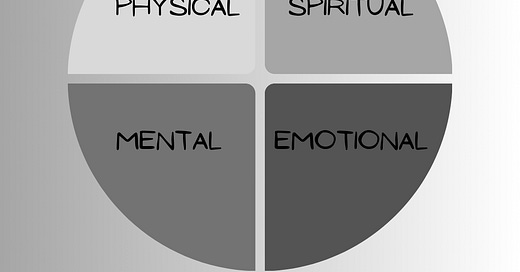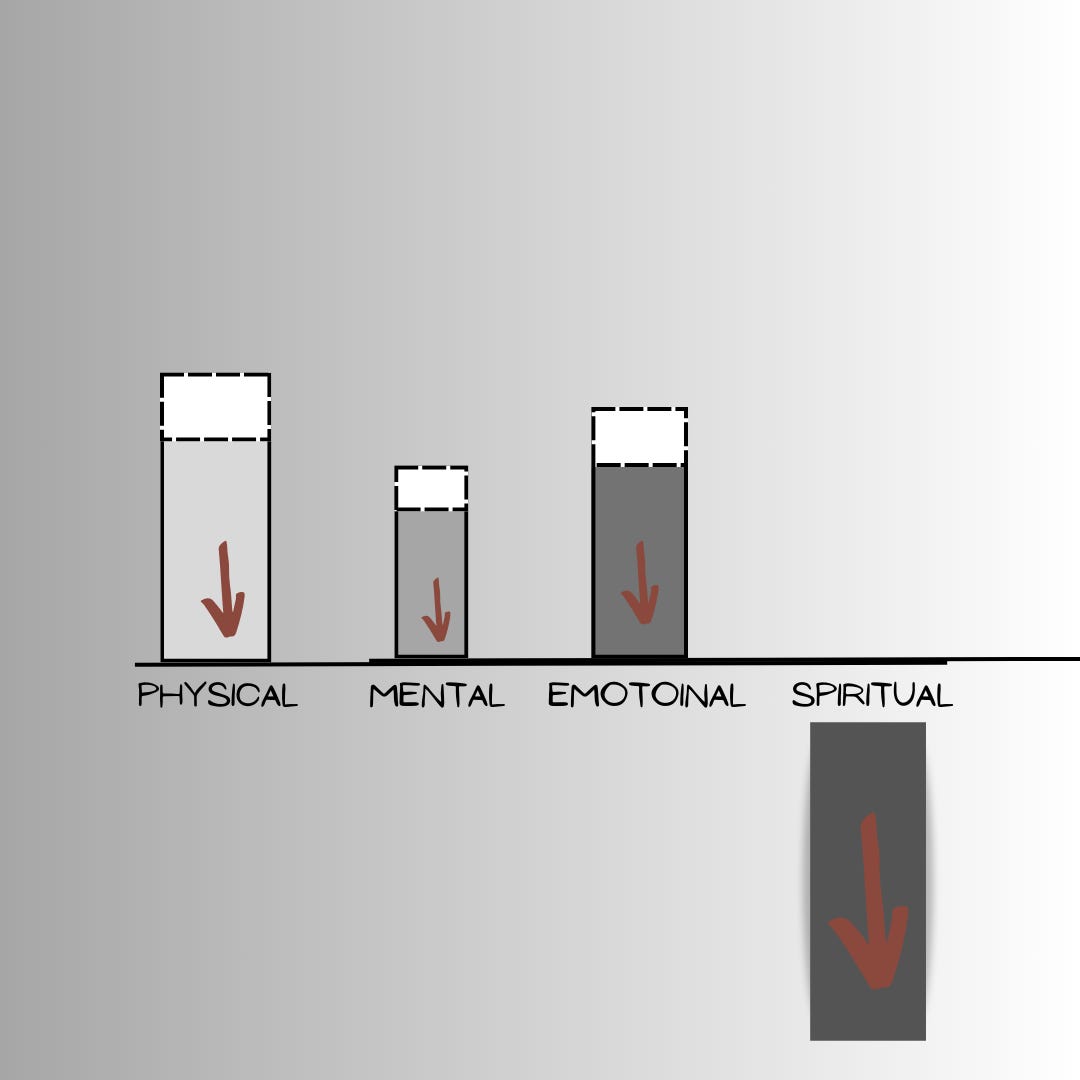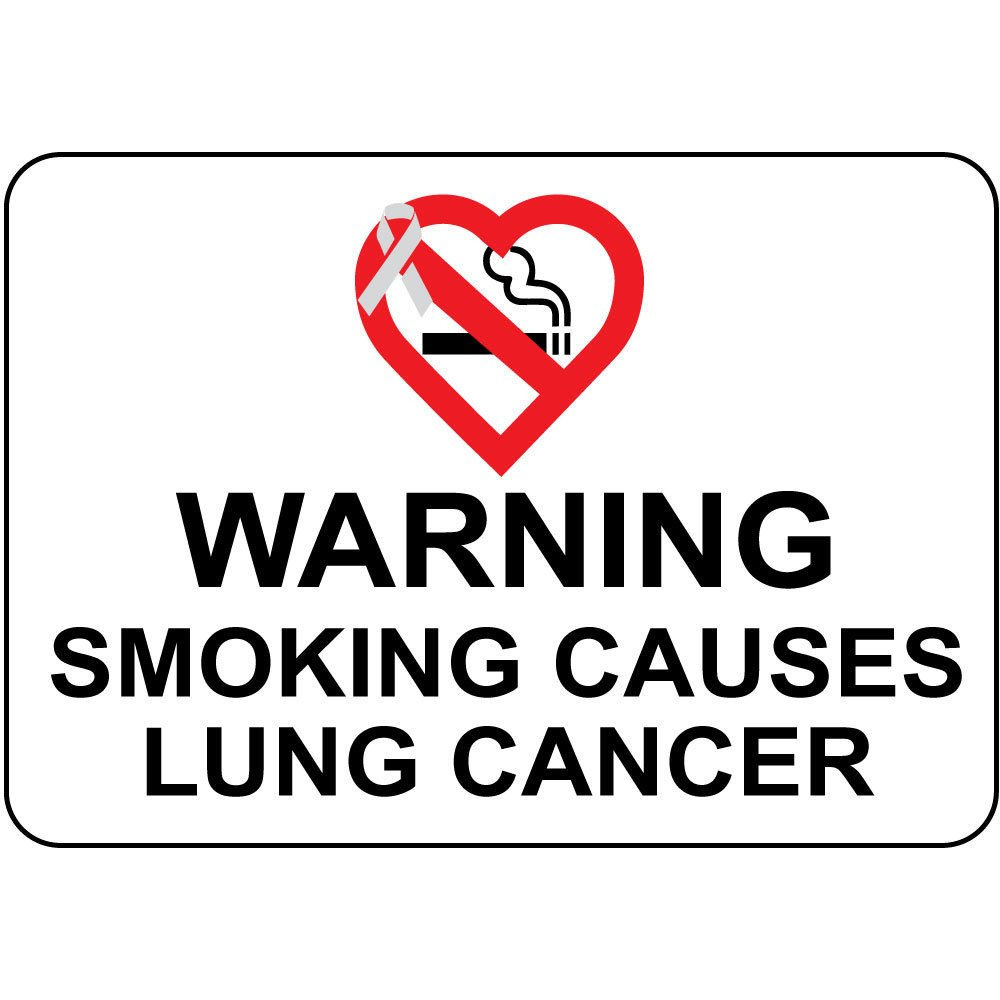I’m starting a new Friday Quick Hits Newsletter that will be available to all subscribers with the intent of making it easier to live a happier, healthier life without the noise. I’m a firm believer in approaching wellbeing from a whole health perspective. We need to nourish the mind, body, and soul just as much as our stomachs, and when we don’t is when maladaptive behaviors, illness, and dis-ease begin to manifest. Read Beyond The Bottom Line (below) to learn more.
The BLUF (Bottom Line Up Front)
· Wellbeing can’t be reduced to just physical or mental symptoms
· Tobacco doesn’t cause cancer? What?!
· The surprising correlation between emotional repression and lung cancer
· A quote from Michael Singer
Beyond The Bottom Line
The purpose of this newsletter is to address wellbeing from a holistic perspective. If you read my book Navigating Chaos: How To Find Certainty In Uncertain Situations, then you’re already familiar with what I called the 4 Pillars of Performance. These are the drivers that compel optimal performance because they comprise the whole of You. They consist of physical, mental, emotional, and spiritual quadrants.
Think of it this way. Nobody performs well in anything if they feel like crap. The absence or lack of a driver in one area creates a pull on the other areas, such that if I’m living life void of meaning, purpose, or connection (spiritual quadrant) then I’m probably not motivated to do much (physical quadrant), I feel depressed (emotional) and I’m probably engaging in negative self-talk (mental). They’re all interconnected.
This is the problem with mental health today, and one of the reasons I decided to make a mid-life career switch and pursue mental health counseling as a therapist. Health cannot be reduced to physicality (attention all MDs!), the mind (ahem, psychologists), cognition (psychiatrists!), or relationship with God (dogmatic practitioners). It’s never just one thing. It’s not just the body, and not just the brain. The head and body are connected, which means everything that happens between them occurs because of the interconnection between mind and body. There’s also a soul element which speaks to the core of who we are—our past, present, and future selves.
Health isn’t any single one of those things. It’s all of them.
And the more health practitioners or the healthcare system compartmentalizes these quadrants—our complete wholeness—the more illnesses, ailments, and diseases we manifest. In his book When The Body Says No, world renowned physician and expert on trauma, Dr. Gabor Maté, discusses just how emotional stress creates physical illnesses, ranging from cancer to autoimmune diseases.
What The Research Says
We’ve all been told not to smoke because “smoking causes lung cancer.”
But if that were true, then everybody who smoked would get lung cancer. If A causes B, then every time A is present, B should follow. If B doesn’t follow A every time, then A cannot, by itself, cause of B. If smoking causes lung cancer, then everybody who ever smoked would develop the disease. The truth is smoking causes cancer no more than swimming causes drowning. Like most things, there are several factors to consider, and not just in the body.
Check this out…
A British chest surgeon named David Kissen found that patients with lung cancer tended to “bottle up” their emotions1. He said that people with lung cancer, “have poor and restricted outlets for the expression of emotion, as compared with non-malignancy lung patients and normal controls.”2 Specifically, he found that men who did not express emotion were five times likelier to develop lung cancer.
Here’s the best part…
Kissen’s study was corroborated by another study3 that spanned 10 years and involved 1,000 men and 400 women. Anybody previously diagnosed with disease was excluded. Participants were interviewed about their emotional coping styles, sense of hope, and physicality, to include cholesterol, weight, blood pressure, and smoking habits. Ten years later, almost half (600) of the study population had died. The researchers found the single greatest risk factor for death to be rationality and anti-emotionality, or R/A (i.e., the repression of anger).
“Cancer incidence was some 40 times higher in those who answered positively to 10 or 11 of the questions for R/A than in the remaining subjects, who answered positively to about three questions on average…We found that smokers had no incidence of lung cancer unless they also had R/A scores of 10 or 11, suggesting that any effect of smoking on the lung is essentially limited to a ‘susceptible minority.”3
The Takeaway: For lung cancer to occur, tobacco alone isn’t enough. Emotional repression enhances the effects of smoke on the body.
However, emotional expression is not the same as emotional impulsivity. The former requires vulnerability, the latter requires mindfulness, compassion, and control. Both manifest for different reasons (beyond the scope of today’s newsletter).
A Quote
“The mind is a place where the soul goes to hide from the heart.”
Thanks for reading and if you liked today’s newsletter, please share it!
Sources
1Kissen, D., & Eysenck, H. J. (1962). Personality in male lung cancer patients. Journal of Psychosomatic Research, 6(2), 123–127. https://doi.org/10.1016/0022-3999(62)90062-4
2Cox, T., & Mackay, C. (1982). Psychosocial factors and psychophysiological mechanisms in the aetiology and development of cancers. Social science & medicine (1982), 16(4), 381–396. https://doi.org/10.1016/0277-9536(82)90048-x
3Grossarth-Maticek, R., Bastiaans, J., & Kanazir, D. T. (1985). Psychosocial factors as strong predictors of mortality from cancer, ischaemic heart disease and stroke: the Yugoslav prospective study. Journal of psychosomatic research, 29(2), 167–176. https://doi.org/10.1016/0022-3999(85)90038-8
Maté M.D., Gabor. When the Body Says No (pp. 85-86). Turner Publishing Company. Kindle Edition.







